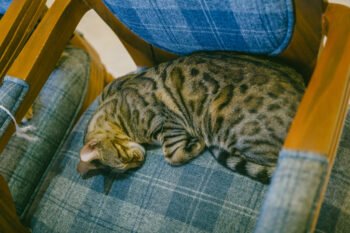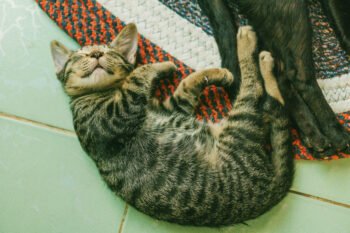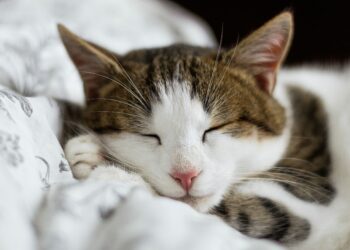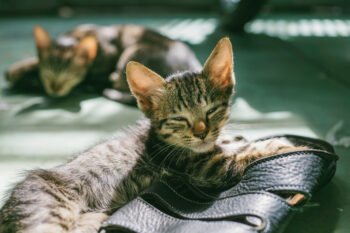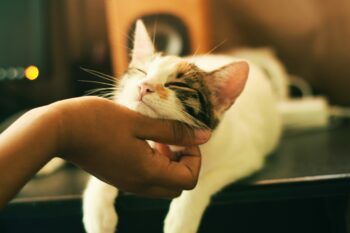Remember the day you brought home your new kitten? He was as rambunctious as he was feisty. But feisty kittens do age, just like the rest of us. Once they have joined the ranks of the elderly, they may complain occasionally, though in most cases they adjust to the limits of old age with a minimum of fuss. They sleep more than they once did, and they seek extra attention and reassurance, but the signs of their aging are seldom dramatic. In fact, if you’re not careful, you may overlook the fact that time is catching up with your feline friend.
When Is Your Cat Old?
As with people, it’s impossible to say exactly when old age arrives. In general, though, a 10-year-old cat is roughly the equivalent of a 57-year-old human. That doesn’t mean that your pet is necessary old, but it probably means that significant physiological changes have begun to take place.
The aging process is gradual in cats and varies greatly among individuals. It is influenced by variations in metabolism, genetics and other factors we can’t control. It is possible, however, to have a positive influence on your cat’s aging and longevity, especially if you start early.
Choose a veterinarian when your cat is young and begin a program of regular veterinary visits. Professional health care, administered over a lifetime, can improve the quality and length of your cat’s life. A well-balanced, nutritionally complete diet will also help him withstand the trials of old age with a stronger constitution.
Spaying or neutering at an early age may also help extend your cat’s life. In fact, altered cats live one and one-half to two times longer than intact cats. Cats may enjoy a healthier, longer life if kept indoors, safe from the dangers of automobiles, disease, dogs and catfights. Under ideal conditions, your cat may live 18 to 20 years. Some cats–with good care, nutrition and strong family genes–make it well into their 20s.
Your Veterinarian
There is no ally more helpful in ensuring your pet’s long and healthful life than your veterinarian. Annual physical checkups are strongly recommended throughout your cat’s lifetime. If you have followed such a program, your veterinarian will know your cat’s medical history and be better equipped to help in times of illness. Once your cat reaches the age of eight or 10, annual or even semi-annual veterinary visits become extremely important. With professional training and sophisticated diagnostic equipment, your veterinarian can detect conditions that may not be apparent to you. Early diagnosis, treatment and management of disease and illness can make a difference for your aging friend.
Tips for Feeding Your Senior Cat
Maintain a fairly strict feeding schedule; cats like routine. They pace themselves pretty well, so obesity is not as much a concern for cats as it is for dogs. However, senior cats are susceptible to weight gain because of lower metabolism and decreased activity level. The quantity of food should be adjusted to meet your senior cat’s decreasing activity level.
Fat cats aren’t healthy cats. Obesity can intensify lameness, put a strain on their hearts, make them poor surgical risks, and reduce the quality of life in general.
Progressive weight loss can also be a serious problem in older cats. It’s important to monitor your cat’s weight and keep a record of any changes. Your senior cat may loose some of his sense of smell and taste, and may have little interest in his food. You may need to tempt him with a favorite treat.
Don’t leave extra food around or set out more then your cat needs.
If you notice your cat gaining weight (when you are unable to feel his ribs), slowly reduce his food intake. Avoid indulging him in constant snacks and treats. Feed him often and in small quantities. If you’re in doubt about how much to cut back, ask your veterinarian.
Discuss with your veterinarian any plans to give your cat vitamin and mineral supplements. This is especially important if your older cat has developed a health condition that requires a special diet. By the way, there are excellent diets available for all types of health problems, but they must be prescribed by your veterinarian.
Finally, for cats of all ages, keep a bowl of fresh water available at all times.
Stress
As cats get older, they have more difficulty adapting to stress and anxiety. Sudden disruptions in routine are particularly upsetting to them. New voices, loud noises, changes in diet, a move to a new house, an unusually unorganized or chaotic household–all of these environmental changes can take their toll on your aging pet.
Stress and anxiety do more than cause an older cat a little discomfort; they can speed up the aging process and even contribute to illness. You should be aware of stress-provoking situations and try to avoid them, if possible.
Sickness
Sickness itself is highly stressful, and being away from home in a veterinary hospital–no matter how good–only makes it worse. That’s why many veterinarians recommend that sick cats be cared for at home, if their condition allows. They fare better in their own familiar environment, and the management of illness can be handled by telephone discussions and return visits to your veterinarian.
If your senior cat has been with you since he was a kitten, you’ve probably seen him through the sniffles, periodic bouts of diarrhea and occasional bites and scrapes. He probably bounced back quickly. Now that he’s older, though, he may not be able to shrug off disease as easily as he once did. You can help by learning about some of the common geriatric ailments that can cause trouble.
Eye and Ear Disorders
Eye discoloration in senior cats is often a normal part of the aging process. Usually it does not interfere with vision and does not need treatment. Some cats develop cataracts, but they are relatively uncommon. If your pet’s eyes become red and watery, the problem could be conjunctivitis. If this condition persists, consult your veterinarian.
Seeing and hearing may diminish with age–one more reason you should not allow your cat to roam outdoors. At home, be patient if he doesn’t always respond to your call, and don’t frighten him by suddenly coming up behind him unannounced.
Tooth and Gum Disease
It’s important to care for the health of your cat’s teeth and gums, starting when he is young. Tartar build-up and enamel erosion are the main causes of serious gum disease.
Your veterinarian can show you how to brush your cat’s teeth–it’s the most effective way to control tartar buildup. A finger brush, pet toothbrush or child’s soft toothbrush along with pet toothpaste is the best combination. Your cat will need regular teeth cleaning by your veterinarian, especially when he gets older. If your cat begins to favor one side of his mouth, or if he suddenly stops eating as if his mouth is sore, have your veterinarian take a look.
Tumors
Tumors can occur in nearly any part of the cat’s body, but you should pay special attention to persistent swelling or inflammation in mammary glands, particularly in unspayed females. Early detection and treatment give your cat the best chance to survive tumors or cancer.
Have your veterinarian check out any lump or bump you find on your cat. Usually, these bumps are not dangerous, but occasionally they are. That’s why it’s best to check.
Kidney Disease
If your cat begins to drink excessively and urinate frequently, he might be suffering from kidney disease, a common disorder among older cats. (This is also one of the signs of diabetes.) There may even be occasional accidents outside the litter box. If this happens, don’t label your pet as senile or naughty; he may be under extreme pressure and unable to hold his urine. Make sure that a litter box is accessible at all times, and keep it clean. Cats are impeccable by nature. See to it that your cat gets the water that he needs.
Report any symptoms to your veterinarian, because both kidney disease and diabetes require immediate treatment.
Heart Trouble
Though not common, heart disease can strike the geriatric cat. Lack of energy, not wanting to move or be moved, coughing and labored breathing are all possible clues. Prompt medical attention is required. Your veterinarian will outline the proper treatment protocol for your cat.
Constipation
Occasional constipation in aging cats is not unusual, but if it persists, consult your veterinarian. Prolonged constipation could be a sign of something more serious.


